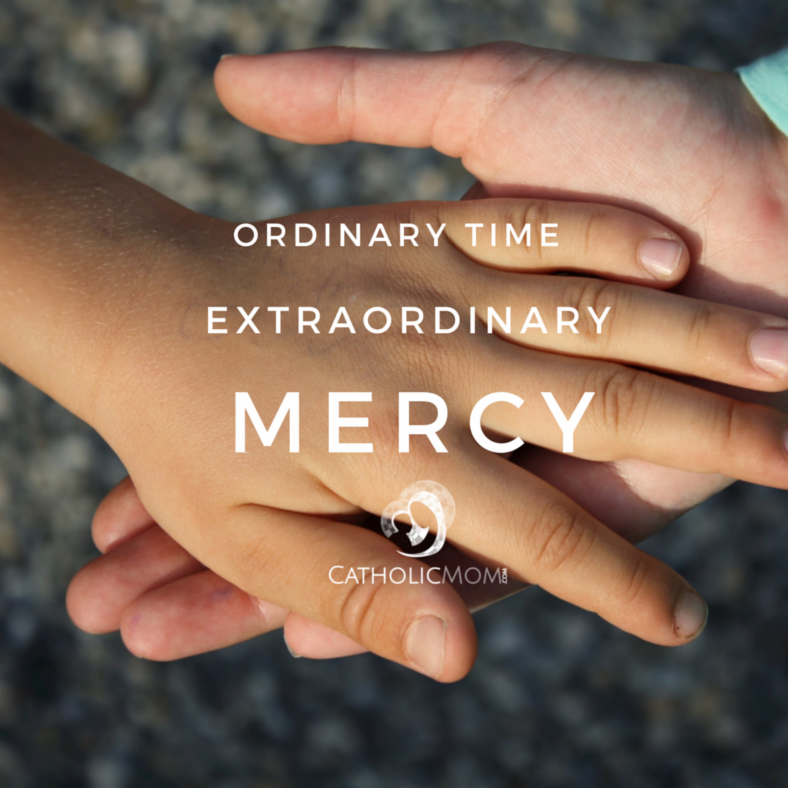This post is part of our Ordinary Time, Extraordinary Mercy series, in which CatholicMom.com contributors will share their own experiences of living the Year of Mercy. Beginning at Pentecost and continuing through the summer, we’ll cover many aspects of the Works of Mercy in family life.
A quick Google search will tell you that "mercy" is "compassion or forgiveness shown toward someone whom it is within one's power to punish or harm." Jesus' model of Divine Mercy comes to us in the form of His brokenness on the Cross, where He offered Himself for our salvation. Rather than leave us to the punishment we rightly deserve, Jesus takes it upon Himself to love us mercifully for our redemption and union with our Father in heaven. I tend to think a lot about mercy in these kinds of terms, as a parent who compassionately bestows mercy on her children.
As I settled into writing this post, I realized I hadn't thought much about teaching mercy to my children so that they could act mercifully toward one another. I have tried to teach them generosity, a forgiving heart, patience, politeness, self-control and to give thanks, and aside from "let's not squish the rolly-polly on the sidewalk" I can't positively say I've intentionally taught them to be merciful - they are only 4, 3, and 20 months old after all.
But, thank goodness for the Holy Spirit and His divine inspiration! Because just as I was starting to feel like a failure for this Year of Mercy, I realized that without using the word "mercy" my husband and I have been building the foundation for a culture of mercy in our home all along. This foundation can even be broken down into a handy acronym - conveniently M.E.R.C.Y.
[Tweet "Learn to build the foundation for a culture of mercy in your home #OTEM"]
M = Model: We have a divine model for mercy, Jesus. When we teach our children stories about Jesus they are learning who He is and what He stands for. They also know what He taught and the kind of life He wants us to live in our family. We ask them the questions: What would Jesus do in this moment? How would he react? Would he withhold, or would he engage? and they know the answers. They know how they are supposed to act. Without necessarily knowing the word mercy, they know who to look to for the best model when it comes to tough situations.
E - Effort. Mercy isn't always easy but it is the way of excellence. We talk with our kids about how some things we ask them to do might be difficult. Maybe one child doesn't want to practice piano. Maybe another is refusing to hold the pencil the proper way because right now it feels funny (both happened today, by the way). Gently encouraging our children to persevere when things are tough or aren't going their way is how we are building a foundation for the effort that mercy takes.
R - Remember. When one child is grabbing toys from another or teasing, we often ask them to recall a time when the tables were turned. "Did you like it when so-and-so grabbed your truck from you? Did you like it, or did it make you upset?" Just as this type of recall helps to reinforce positive choices, we need to remember times when we were shown mercy (Remember the parable of the unmerciful servant?). We draw strength from those times to help offer mercy to others, especially in those moments when you don't want to but know you need to.
C - Compassion and Communio. Being merciful means having compassion for someone and seeing the Thou in the person before you. Martin Buber, a Jewish philosopher, pioneered the understanding of "I and Thou." When we are truly merciful, we enter into communio or communion with the other person. We allow ourselves to see things from their perspective, to be filled with the love that God has for that person as a distinct image of God. When I ask my children, "How do you think she or he feels about what you did?" I'm asking them to see things from the other's perspective. I'm asking them to recognize that their actions hurt or upset another person with thoughts and feelings, not an it like a chair or the wall. That other person is not an it, they are a beloved child of God.
Y - You. This is your action, your choice. Mercy isn't contingent on the other person's actions, their request for forgiveness (or lack thereof). Jesus doesn't tell us He will only be merciful IF we complete x,y, and z tasks. He doesn't withhold mercy because He is spiteful or petulant. St. Faustina tells us that there is an ocean of mercy that Jesus showers upon us if we would just open our hands to receive it. I was once told about a mom who instructed her children in this way regarding forgiving an offense: Whether the transgressor is sincere in their request for an apology is not your concern. That's between them and God. You have your own choice to make, to mercifully forgive like Jesus does or to withhold your mercy like the ungrateful servant. You will have to give an account of how you choose to God. Yes, we are teaching our children to be sincere when they need to ask for forgiveness, but we are also teaching them that giving forgiveness should be freely given rather than a series of hoops to jump through.
So mercy. It's a small word that packs so much meaning. Even if our children may not be old enough to fully understand the concept, we can build a mercy foundation in our everyday life. And we will definitely start intentionally using the word.
How are you building a foundation of mercy for your family? I hope some of the ideas here have helped you realize all the merciful lessons you are teaching your children every day and gave you some ways to build up a culture of mercy in your home.
Read the other articles in our "Ordinary Time, Extraordinary Mercy" series.
Copyright 2016 Kate Taliaferro
About the Author

Kate Taliaferro
Kate Taliaferro is an Air Force wife and mom of 6. She has a Masters in Religious Education and tries to find God's presence in all parts of her day, be it cooking, cleaning or just the everyday ordinary. She enjoys homeschooling, stitching crafts and finding cheerios between the couch cushions. She blogs at Daily Graces.



.png?width=1806&height=731&name=CatholicMom_hcfm_logo1_pos_871c_2728c%20(002).png)
Comments